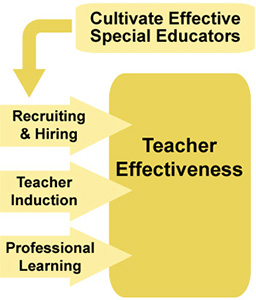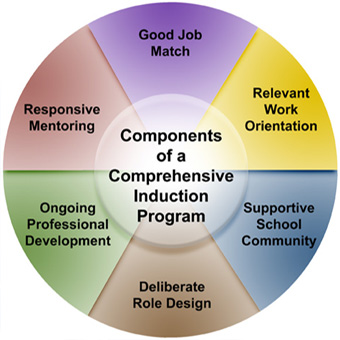What can school leaders do to reduce the number of special education teachers who leave each year?
Page 4: Teacher Induction
 Many professions—for example, medicine—offer extensive supports to new entrants. These are designed to help new professionals to learn more about the work they are undertaking. Teachers, however, are often expected to take on all of the responsibilities of experienced veterans as soon as they begin teaching. One way to address the needs of new teachers is through the provision of teacher induction programs. These offer supports to help new teachers transition into a school placement and become competent and effective professionals in the classroom. Induction is a critical phase of teacher development because:
Many professions—for example, medicine—offer extensive supports to new entrants. These are designed to help new professionals to learn more about the work they are undertaking. Teachers, however, are often expected to take on all of the responsibilities of experienced veterans as soon as they begin teaching. One way to address the needs of new teachers is through the provision of teacher induction programs. These offer supports to help new teachers transition into a school placement and become competent and effective professionals in the classroom. Induction is a critical phase of teacher development because:
- Teachers need support as they begin to apply what they learned in pre-service programs in the real world of teaching.
- The early career period is often characterized as one of “survival” in which optimism sometimes gives way to discouragement and disillusionment.
- New special educators are more likely than are experienced teachers to leave their jobs. Recall that some estimates suggest that up to 50% of new teachers leave in the first several years.
- Teachers who have minimal preparation are more likely to leave than are their more extensively prepared peers and, therefore, might need intensive supports.
Research Shows
- Teachers who receive a range of induction supports are more likely to stay in the teaching profession.
(Smith & Ingersoll, 2004) - Special education teachers who receive higher levels of induction support are better able to manage their jobs.
(Billingsley, 2004)
Listen as Lee Kirkpatrick discusses his district’s teacher induction program (time: 1:01).
Lee Kirkpatrick
Student Support Services Supervisor, Franklin Special School District
Former Elementary Principal
Franklin, Tennessee

Transcript: Lee Kirkpatrick
Beginning and new teacher induction program is required of all new hires and new employees to the district. It’s a five-year program. It is a really strong mentoring program where a veteran teacher is paired with a young teacher and is there for that teacher on a professional level but also on a personal level. I think the connection that they make that way is really important. They might have just had a horrible day. They might have just had some terrible experiences or some things that they’re just really perplexed about, and they don’t know what their next step is. If they can get that off their chest and they can collaborate with a mentor or maybe even their team, they’re going to get some ideas about what are my next steps? So I think that professional learning community, that special ed team is critical to a young teacher’s success.

This graphic illustrates the components of a comprehensive teacher induction program. For more detailed information about these components, view the IRIS Module:
Although some state education agencies (SEAs) support teacher induction, some district leaders have to manage the development and support of these programs on their own. Doing so requires careful planning as well as the establishment of personnel and fiscal resources to support program elements (e.g., professional development, compensation for mentors, monitoring of induction effectiveness). The table below describes some actions school leaders can take to increase the effectiveness of their teacher induction program.
The goals of induction programs should be clear to all involved, including leaders, teachers, and mentors. Typical goals include:
- Helping teachers transition to teaching careers
- Communicating district and school policies and procedures
- Helping teachers increase their effectiveness
- Retaining teachers
In addition to one-on-one mentor support with observations and feedback about teaching, strong induction programs involve multiple components to meet the needs of new teachers. These often include:
- Orientations to the district, school, and community
- Clear role expectations
- Meetings with other new teachers
- On-going opportunities to learn
New teachers also need to have opportunities to connect to the entire school community. Teachers who experience a sense of belonging in their schools and receive emotional support during their first years may be more likely to stay.
Mentors need careful preparation to help assess new teachers’ needs and to provide critical supports to help them learn and apply evidence-based practices. Learning how to observe and provide feedback to new teachers is a skill that must be acquired.
Evaluate whether mentors support new teachers in areas such as:
- Managing the emotional stress of the first year
- Developing skills in areas in which they struggle (e.g., student behavior; collaborating with general educators, administrators, and families)
The effectiveness of the induction program can be monitored in a number of ways. These include:
- Engaging in routine communication with new teachers and mentors
- Reviewing how mentors and mentees are performing on formative and summative evaluations
- Monitoring retention of new teachers
Mars Hill Middle School
In previous years, Clara Kamei had received some less-than-enthusiastic reviews of the district’s induction program from her special ed teachers. She makes a few phone calls and arranges a meeting among the special ed teachers at her school and two neighboring schools. She hopes this group can become both a support group and a working group where special ed teachers share instructional advice and express their needs and frustrations.